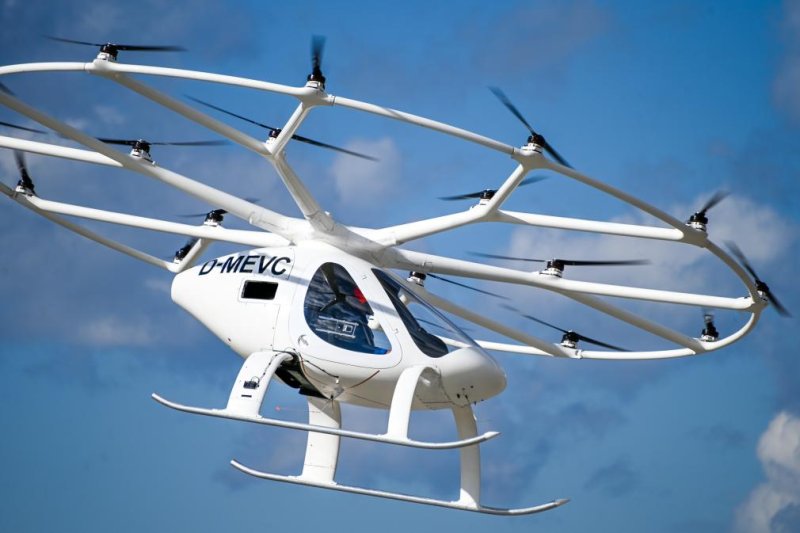By Thomas Maresca

1/8
South Korea conducted a test flight of a drone taxi at Seoul's Gimpo Airport on Thursday, connecting it into the airport's traffic control system. Photo by Thomas Maresca/UPI
SEOUL, Nov. 11 (UPI) -- South Korea tested an air traffic control system for drone taxis Thursday, taking a key step forward in the government's plans to bring flying vehicles to the country's skies by 2025.
An electric two-seater air taxi flew a short loop around Seoul's Gimpo Airport, while new technologies were used to successfully integrate it into the airport's existing traffic management system.
The Ministry of Land, Infrastructure and Transport, which hosted Thursday's demonstration, said the test intended to ensure that flying taxis wouldn't interfere with air traffic at the busy airport as they are rolled out commercially.
"As [Urban Air Mobility] is expected to become one of the common means of transportation that citizens use in daily life, it is absolutely imperative that we test and try out UAM services in various environments through demonstrations," Minister Noh Hyeong-ouk, who attended the event, said in a statement.
RELATED South Korea on track to launch commercial air taxis in 2025
South Korea has been pushing in recent years to develop its air taxi industry, laying out a policy framework in 2020 and a technology roadmap this year. The government has set aside more than $65 million to build out its air mobility ecosystem.
For Thursday's test, a pilot flew a vertical takeoff and landing drone, made by Germany's Volocopter, for about five minutes at an altitude of 165 feet and a top speed of 28 mph.
Florian Reuter, CEO of Volocopter, said that the air mobility industry was at an "exciting inflection point," with commercial service rolling out in several countries over the next two to three years.

The two-seat electric drone was manufactured by Germany's Volocopter, which has agreements in place to launch commercial air taxi services in Singapore and Paris. Photo by Thomas Maresca/UPI
The Bruchsal-based company is planning to launch commercial air taxi service in Singapore by the end of 2023 and in Paris in time for the start of the 2024 Summer Olympics.
"What we are discussing here today are really the humble beginnings of a much more profound change that we will see unfold over the decades," Reuter said to reporters at the event.
"The general transportation landscape will move up into the third dimension, which offers vast opportunity for growth and vast opportunities to improve urban mobility."
"What we are discussing here today are really the humble beginnings of a much more profound change that we will see unfold over the decades," Reuter said to reporters at the event.
"The general transportation landscape will move up into the third dimension, which offers vast opportunity for growth and vast opportunities to improve urban mobility."
RELATED Hyundai aims to develop hydrogen fuel commercial vehicles by 2028
South Korea continues to lag Europe and the United States in commercializing flying vehicles, but the country is moving forward aggressively with a public-private team of government, academic and corporate partners overseen by the transport ministry.
Among the South Korean companies eager to bring their own drone vehicles to market are automaker Hyundai Motor Group and defense contractor Hanwha, which showed off a scale version of its five-passenger drone, called Butterfly, at the event Thursday.
Eric Hunwoo Yun, director of Hanwha's urban air mobility division called the drone business a "top priority" for the company and said that South Korea is looking to be a major global player in the industry.
"The Korean government wants to be [an urban air mobility] leader," Yun said.
The country's initial plans for commercial service will focus on routes from downtown Seoul to Gimpo and Incheon airports. Journeys would take about 20 minutes instead of up to an hour by car, according to the transport ministry.
In the first phase, the drones will be controlled by a pilot, but by 2030, they will be remote-controlled, the ministry said. And By 2035, the country plans to launch fully autonomous air taxis.
Investment bank Morgan Stanley projected in a May report that the global urban air mobility market would reach $1 trillion by 2040 and accelerate to a whopping $9 trillion by 2050.

4 / 8A pilot took the air taxi on a five-minute flight at an altitude of 165 feet and a top speed of 28 mpg. Photo by Thomas Maresca/UPI
No comments:
Post a Comment